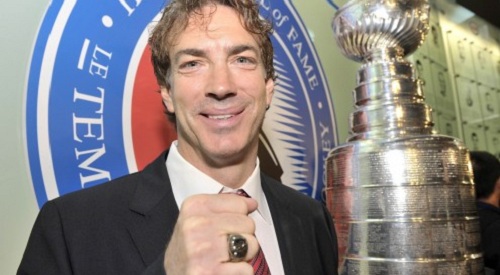
The Stanley Cup Stigma
It is an argument sure to raise voices, opposing viewpoints and enthusiastic debate amongst hockey fans.
How great is a player’s hockey career if he never managed to win “The Big One;” if he never had the opportunity to hoist Lord Stanley; if he retires or sees his career cut short without a gaudy, jewel encrusted ring on his finger?
Winning a Stanley Cup instantly boosts a player’s hockey resume by adding to it an aura of exclusivity. It’s the hockey equivalent to a degree from Harvard. It adds a sort of authenticity to a player. It denotes that a player has been through the grind of a demanding season, grueling playoffs, and emerged the victor. When the issue of being a champion arises, he’s afforded the ability to say he’s “been there, done that.”
However, while the merits of winning a Stanley Cup are well documented, winning a title doesn’t define a player’s career. Nor should it.
Hockey is, first and foremost, a team game. Unlike the three other major North American sports leagues, save for the shootout in the regular season (which is omitted in the playoffs, thankfully) the game is rarely decided on the basis of one-on-one situations or pure individual talent.
Other than the rare penalty shot in the playoffs, team cohesiveness is what wins games. That’s not to say playing as a team isn’t required in other leagues, but the game of hockey is more transient.
[php snippet=1]
It isn’t basketball, where the star player operates in isolation or a poor free throw shooter is intentionally fouled. It isn’t baseball where a player can be intentionally walked. Nor is it football where the pressure is on the kicker if a team is inside field goal range.
Instead, when assessing a player’s career, more than a Stanley Cup title, or lack thereof, needs to be taken into account.
Case in point, the 2012 Hockey Hall of Fame Inductees.
Out of the four players in the 2012 class (Pavel Bure, Adam Oates, Joe Sakic and Mats Sundin), only Sakic has hoisted hockey’s Holy Grail.
Pavel Bure was at the forefront of hockey’s Russian frontier in the early 90s. His speed, skill and preternatural goal-scoring ability opened the eyes of NHL fans everywhere. Ditto for Mats Sundin, who helped carry the torch for Sweden during his tenure in the NHL. The playmaking ability of Adam Oates turned many who played alongside him into constant scoring threats, and while Joe Sakic does have two championships and a bevy of personal awards, if he didn’t he would still be held in high regard thanks to his contributions to Canada during international play.
As the induction of Bure and Sundin in particular will attest, a player’s career is defined by so much more than NHL contributions.
Bure’s career is almost a sociological and anthropological study in the advent of Russian hockey. While the penchant for playing a “skill” game has been noted throughout history with regards to Russian hockey players, Bure ushered in a new era. He was a new breed of Russian superstar that helped foster an even more dynamic style of play in his homeland.
Mats Sundin retires as one of the greatest Swedish players of all-time and his hockey success has been instrumental in the growth of the sport in his home country, as well as its improvement on a world scale. After Bjore Salming, Sundin, along with Daniel Alfredsson, Peter Forsberg and Niklas Lidstrom became synonymous with Swedish hockey. Although he never managed to win a Stanley Cup, his international play speaks volumes about his ability to win.
Although Adam Oates was never a fixture on the international hockey scene, his career mirrors an uplifting, inspirational Hollywood movie plot. An undrafted kid gets his shot at the big leagues and places sixth all-time in career assists when all is said and done. As one of the league’s premier playmakers, Oates had the ability to make those around him better, which is a hallmark of a player who puts the team above all else.
As for Joe Sakic, the reserved and humble superstar, while he’s remembered for his greatness in the NHL, if he didn’t win a Stanley Cup or an individual NHL award in his career, his performance at the 2002 Olympics would ensure he would be revered across Canada and throughout the hockey community.
So while arguments about great players who have never won a Stanley Cup generally tend to include a “but,” as in, “He was a great player, but he never won a Stanley Cup,” it’s a shortsighted and illogical point of view to put forth. Although it’s an argument for another day, one could make a case for an Olympic gold medal being harder to win than an NHL championship.
A Stanley Cup isn’t the barometer for individual success in hockey. The game has so many facets and so many ways for a player to make his impact, it’s just one part of the bigger picture.
Criticism aside regarding the Hockey Hall of Fame and their induction process, the class of 2012 proves that hoisting a silver chalice isn’t the only way to carve out one’s legacy in hockey.
[php snippet=1] http://credit-n.ru/zaymyi-next.html

